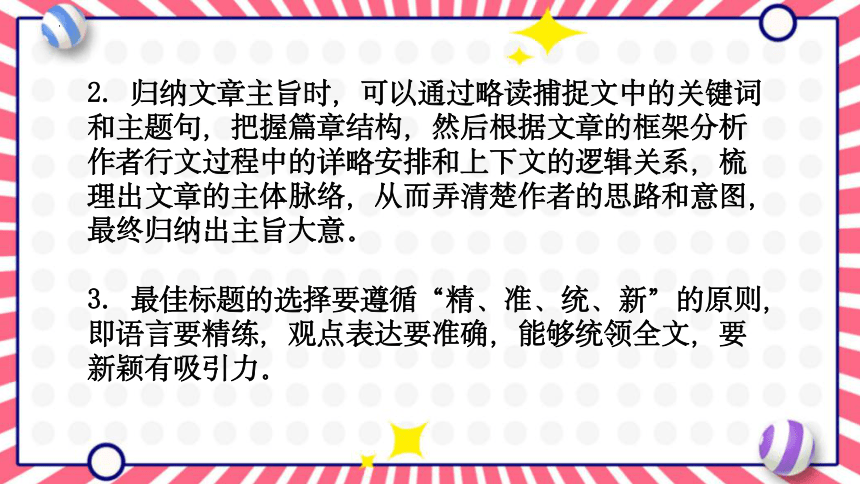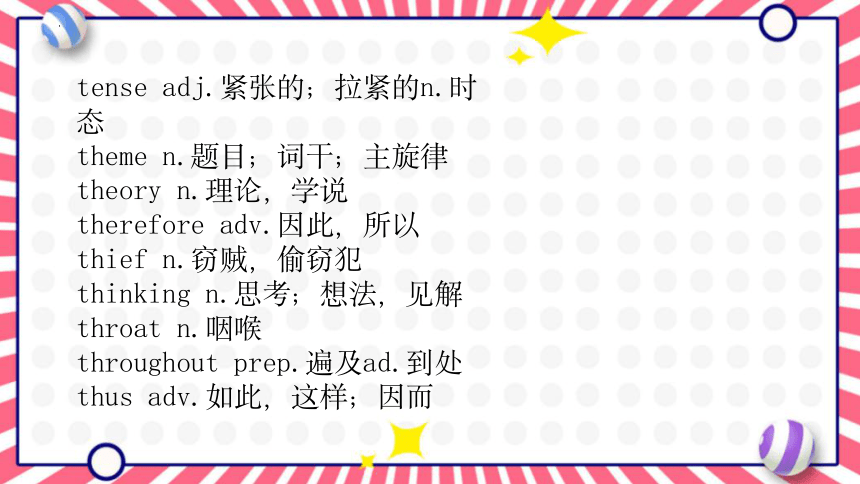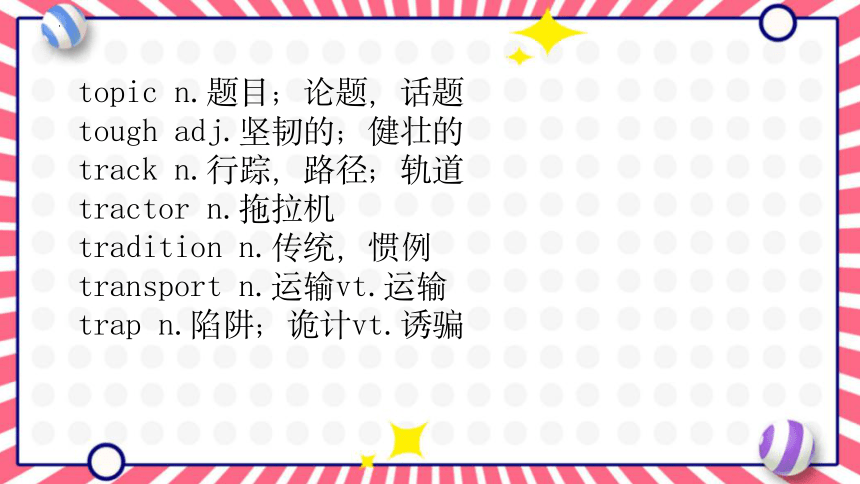2024届高考英语复习阅读理解单词梳理 课件 (共31张PPT)
文档属性
| 名称 | 2024届高考英语复习阅读理解单词梳理 课件 (共31张PPT) |  | |
| 格式 | pptx | ||
| 文件大小 | 16.9MB | ||
| 资源类型 | 教案 | ||
| 版本资源 | 通用版 | ||
| 科目 | 英语 | ||
| 更新时间 | 2024-05-27 21:12:51 | ||
图片预览












文档简介
(共31张PPT)
高考英语阅读理解
词汇梳理
知识分析
01
词义猜测题
词义猜测题是高考英语阅读理解的必考题型,旨在考查考生在阅读文章时通过各种方法或技巧猜测生词含义、理解语块含义及明确代词指代的能力。
解题点津:
1. 利用构词法可以较为准确地猜测词义,但是这种方法更多用于解决阅读理解文本中的障碍词汇,可以直接利用构词法解题的题目较少。
2. 可以根据语法关系猜测词语的含义,如同位语、定语从句、表语从句、平行结构等,也可以根据逻辑关系、生活常识、文化背景等来猜出单词、短语或句子的意思。
3. 在利用各种方法猜出词语或句子的意思后不要匆忙作答,要将含义代入原文,检查是否符合上下文语境。
主旨大意题
主旨大意类的题目在阅读理解中的占比虽然不大,但是难度较大,是考生较为容易失分的类型,主要考查形式有三种:段落大意题、文章大意题、最佳标题题。
解题点津:
1. 段落的主旨句要根据段落的开展方式来确定,一般在段首或段尾,但有时也可能在段中或需要考生自己总结。
2. 归纳文章主旨时,可以通过略读捕捉文中的关键词和主题句,把握篇章结构,然后根据文章的框架分析作者行文过程中的详略安排和上下文的逻辑关系,梳理出文章的主体脉络,从而弄清楚作者的思路和意图,最终归纳出主旨大意。
3. 最佳标题的选择要遵循“精、准、统、新”的原则,即语言要精练,观点表达要准确,能够统领全文,要新颖有吸引力。
写作意图题
这类题要求考生不仅能理解文章的内容,还要具备对作者所阐述的问题及使用的写作手法进行分析和归纳总结的能力。
解题点津:
1.主旨推断法:写作目的通常是阐述作者为何要表达某个中心主题,因此可根据文章或段落的主旨推断作者的写作目的。
2.文体推断法:不同体裁的文章有不同的写作目的,比如广告类应用文的写作目的是推销产品或服务,议论文的写作目的是阐述论点,科普类说明文的写作目的是介绍科学知识。
阅读理解必备词汇:
teenager n.青少年
telegram n.电报
telegraph n.电报(机) v.发电报
telescope n.望远镜
television n.电视,电视机
temple n.神殿,庙宇;太阳穴
temporary adj.暂时的,临时的
tend vi.走向,趋向
tendency n.趋向,趋势
tense adj.紧张的;拉紧的n.时态
theme n.题目;词干;主旋律
theory n.理论,学说
therefore adv.因此,所以
thief n.窃贼,偷窃犯
thinking n.思考;想法,见解
throat n.咽喉
throughout prep.遍及ad.到处
thus adv.如此,这样;因而
tight adj.紧的;紧身的ad.紧紧地
timetable n.时间表;时刻表
tin n.锡;罐头
tip vt.轻击vi.给小费n.小费
tire vi.疲劳;厌倦n.轮胎
title n.标题,题目;称号,头衔
tobacco n.烟草,烟叶
tolerate vt.忍受,容忍
topic n.题目;论题,话题
tough adj.坚韧的;健壮的
track n.行踪,路径;轨道
tractor n.拖拉机
tradition n.传统,惯例
transport n.运输vt.运输
trap n.陷阱;诡计vt.诱骗
trend vi.伸向;倾向n.倾向
trial n.试验;审判
trick n.诡计;窍门vt.哄骗
type n.类型vi.打字
typewriter n.打字机
typical adj.典型的,代表性的
typist n.打字员
tyre n.轮胎
underline vt.在…下划线;强调
understanding n.理解,理解力
unfair adj.不公平的
uniform adj.一样的n.制服
unique adj.唯一的
unite vi.联合vt.使联合
united adj.一致的;联合的
universe n.宇宙,世界
unknown adj.未知的,不知名的
unusual adj.不平常的,独特的
update vt.更新,使现代化n.现代化,更新
upset vt.使不适,使心烦n.混乱
upward adj.向上的,上升的ad.向上,往上
urban adj.都市的
urgent adj.紧急的
usually adv.通常
valley n.山谷,流域
valuable adj.值钱的,有价值的n.贵重物品
variety n.多样化,种类
various adj.各种各样的
vast adj.巨大的,广阔的
vehicle n.车辆
verb n.动词
victim n.牺牲者,受害者
view vt.看待;看n.见解;风景
violent adj.猛烈的,狂暴的
virus n.病毒
visa n.签证;信用卡
volunteer n.志愿者vt.志愿
vote n.选举,投票
voyage n.航海vi.航海,航空
wage n.工资,报酬
waiter n.侍者,服务员
waitress n.女侍者,女服务员
wave n.波,波涛;起伏vi.波动;挥手
weakness n.弱点
web n.(蜘蛛)网,网状物;网络
website WWW(环球网)的站点
wedding n.婚礼
weed n.杂草,野草vi.除草
well-known adj.众所周知的
whisper vt.低声地讲vi.低语n.耳语,私语
whistle n.口哨vi.吹口哨
wild adj.野生的;野蛮的n.荒地
willing adj.心甘情愿的
wind n.风
wipe vt.揩,擦n.揩,擦
wire n.金属线,电缆
within prep.在…里面;不超过
witness n.证据;证人vt.目击
wooden adj.木制的;呆板的
wool n.羊毛,毛线
worse adj.更坏的ad.更坏
worst adj.最坏的ad.最坏地
worthwhile adj.值得的
would aux.将;愿意
youth n.青春;青年
hostile a. 敌对的,敌意大
household n. 家庭,户
hook n. 钩
holy a. 神圣地,圣洁的
hint n. 暗示,示意
hesitate v. 犹豫
highlight vt. 强调,突出
hence ad. 因此,所以;今后,从此
herd n. 兽群,牧群
genuine a. 真的,真诚的
gasoline n. 汽油
germ n. 微生物,细菌
gesture n. 姿势,手势
giant a. 巨大的 n. 巨人,巨物
glimpse n. 一瞥,一看
glory n. 光荣,荣誉
glorious n. 光荣的,极好的
golf n. 高尔夫球运动
hydrogen n. 氢
oxygen n. 氧
liberal a. 自由得
liberty n. 自由
license /license n. 许可证,执照
moisture n. 潮湿
motivate vt. 激励,激发
motive n. 动机,目的
generate vt. 生成,产生(光、热、电等)
genius n. 天才,天赋
gallery n. 画廊
gallon n. 加仑
gap n. 间隔,差距
garbage n. 垃圾,废物
gaze v. 凝视,注视
gear n. 齿轮,传动装置
gene n. 基因
lest conj. 唯恐,免得
liable a. 可能的,大概的;(to)易于...的
elastic n. 橡皮圈(带) a. 有弹性的
elbow n. 肘
electron n. 电子
volcano n. 火山
volume n. 卷,册;体积,容量
fatigue n. 疲劳,劳累
faulty a. 有错误的,有缺点的
favorable a. 有利的,顺利的
favorite a. 特别受喜欢的 n. 喜爱的人或物
模拟练习
02
Every day, we are inching closer to some kind of artificial intelligence. Advances in big data, machine learning and robotics are going to give us a world where computers are effectively intelligent in terms of how we deal with them. Should you be scared by this Absolutely, but not in the usual “robot overlords” (机器人帝国) kind of way. Instead, the real fear should be about getting human beings wrong, not getting AI right.The key to the technology is the ability of computers to recognize human emotions based on the ‘‘activation” of muscles in the face. A computer can identify the positions of facial muscles and use them to infer the emotional state of its user. Then the machine responds in ways that take that emotional state into account.One potential application of it is to provide “emotional robots” for the elderly. Having a machine that could speak in a kind way would comfort a lonely older person. That is a good thing, right But that won’t also relieve us from questioning how we ended up in a society that takes care of the elderly because we don’t know what else to do with them Can’t we have more humane solutions than robots
“Emotion data” aren’t the same thing as the real and vivid emotional experiences we human beings have. Our emotions are more than our faces or voices. How can they be pulled out like a thread, one by one, from the fabric of our being Research programs can come with much philosophical concern, too. From the computers’ point of view, what the computing technology captures are emotions, but at its root is a reduction of human experience whose outward expressions can be captured algorithmically (计算上). As the technology is used in the world, it can reframe the world in ways that can be hard to escape from.The technology will clearly have useful applications, but once it treats emotions as data, we may find that it is the only aspect of emotion we come to recognize or value. Once billions of dollars floods into this field, we will find ourselves trapped in a technology that is reducing our lives. Even worse, our “emotion data” will be used against us to make money for someone else. And that is what scares me about AI.
12. Why does the author feel scared of the development of artificial intelligence A. The technology is developing much too slowly.B. Computers can’t recognize human emotions.C. Robots would get control of human beings.D. People may use artificial intelligence improperly.13. Why does the author dislike the idea of providing “emotional robots” for the elderly A. The aged people will find it hard to live with them.B. What elderly people need is much more than that.C. It can’t relieve us of the pressure from modern society.D. It’s impossible to use them to keep the elderly healthy.14. What does the author intend to conclude in Paragraphs 4 and 5 A. Emotional data can’t be equal to human emotions.B. AI technology itself has fewer and fewer faults.C. AI-built-in robots won’t have the ability to understand human beings.D. The information computers get can reframe human emotions.15. How does the author think about ‘‘emotion data” according to the last paragraph A. It can arouse people’s sense of value.B. It can improve people’s human experience.C. It may be misused as a tool to make profits.D. It may push the AI technology forward.
【答案】12. D 13. B 14. A 15. C【解析】本文讲述我们正在接近某种人工智能。大数据、机器学习和机器人技术的进步将给我们带来一个世界,在这个世界里,计算机在处理它们的方式上是非常聪明的。同时文章介绍了一个潜在的 “情感数据”,它将被用来对付我们,为别人赚钱,这就是作者对人工智能的恐惧。12. 细节理解题。根据第一段中Absolutely, but not in the usual “robot overlords” (机器人帝国) kind of way. Instead, the real fear should be about getting human beings wrong, not getting AI right. 作者对人工智能的发展感到害怕是因为人们可能不恰当地使用人工智能。故选D。13. 推理判断题。根据第三段中But that won’t also relieve us from questioning how we ended up in a society that takes care of the elderly because we don’t know what else to do with them Can’t we have more humane solutions than robots 由此可知,作者不喜欢为老年人提供“情感机器人”的想法是因为老年人所需要的远不止这些。故选B。14. 细节理解题。根据第四段中“Emotion data” aren’t the same thing as the real and vivid emotional experiences we human beings have.由此可知,情感数据不可能等同于人类的情感。故选A。15. 细节理解题。根据最后一段中Even worse, our “emotion data” will be used against us to make money for someone else. And that is what scares me about AI.可知,作者认为‘‘emotion data” 可能被滥用作一种盈利的工具。故选C。
thanks
高考英语阅读理解
词汇梳理
知识分析
01
词义猜测题
词义猜测题是高考英语阅读理解的必考题型,旨在考查考生在阅读文章时通过各种方法或技巧猜测生词含义、理解语块含义及明确代词指代的能力。
解题点津:
1. 利用构词法可以较为准确地猜测词义,但是这种方法更多用于解决阅读理解文本中的障碍词汇,可以直接利用构词法解题的题目较少。
2. 可以根据语法关系猜测词语的含义,如同位语、定语从句、表语从句、平行结构等,也可以根据逻辑关系、生活常识、文化背景等来猜出单词、短语或句子的意思。
3. 在利用各种方法猜出词语或句子的意思后不要匆忙作答,要将含义代入原文,检查是否符合上下文语境。
主旨大意题
主旨大意类的题目在阅读理解中的占比虽然不大,但是难度较大,是考生较为容易失分的类型,主要考查形式有三种:段落大意题、文章大意题、最佳标题题。
解题点津:
1. 段落的主旨句要根据段落的开展方式来确定,一般在段首或段尾,但有时也可能在段中或需要考生自己总结。
2. 归纳文章主旨时,可以通过略读捕捉文中的关键词和主题句,把握篇章结构,然后根据文章的框架分析作者行文过程中的详略安排和上下文的逻辑关系,梳理出文章的主体脉络,从而弄清楚作者的思路和意图,最终归纳出主旨大意。
3. 最佳标题的选择要遵循“精、准、统、新”的原则,即语言要精练,观点表达要准确,能够统领全文,要新颖有吸引力。
写作意图题
这类题要求考生不仅能理解文章的内容,还要具备对作者所阐述的问题及使用的写作手法进行分析和归纳总结的能力。
解题点津:
1.主旨推断法:写作目的通常是阐述作者为何要表达某个中心主题,因此可根据文章或段落的主旨推断作者的写作目的。
2.文体推断法:不同体裁的文章有不同的写作目的,比如广告类应用文的写作目的是推销产品或服务,议论文的写作目的是阐述论点,科普类说明文的写作目的是介绍科学知识。
阅读理解必备词汇:
teenager n.青少年
telegram n.电报
telegraph n.电报(机) v.发电报
telescope n.望远镜
television n.电视,电视机
temple n.神殿,庙宇;太阳穴
temporary adj.暂时的,临时的
tend vi.走向,趋向
tendency n.趋向,趋势
tense adj.紧张的;拉紧的n.时态
theme n.题目;词干;主旋律
theory n.理论,学说
therefore adv.因此,所以
thief n.窃贼,偷窃犯
thinking n.思考;想法,见解
throat n.咽喉
throughout prep.遍及ad.到处
thus adv.如此,这样;因而
tight adj.紧的;紧身的ad.紧紧地
timetable n.时间表;时刻表
tin n.锡;罐头
tip vt.轻击vi.给小费n.小费
tire vi.疲劳;厌倦n.轮胎
title n.标题,题目;称号,头衔
tobacco n.烟草,烟叶
tolerate vt.忍受,容忍
topic n.题目;论题,话题
tough adj.坚韧的;健壮的
track n.行踪,路径;轨道
tractor n.拖拉机
tradition n.传统,惯例
transport n.运输vt.运输
trap n.陷阱;诡计vt.诱骗
trend vi.伸向;倾向n.倾向
trial n.试验;审判
trick n.诡计;窍门vt.哄骗
type n.类型vi.打字
typewriter n.打字机
typical adj.典型的,代表性的
typist n.打字员
tyre n.轮胎
underline vt.在…下划线;强调
understanding n.理解,理解力
unfair adj.不公平的
uniform adj.一样的n.制服
unique adj.唯一的
unite vi.联合vt.使联合
united adj.一致的;联合的
universe n.宇宙,世界
unknown adj.未知的,不知名的
unusual adj.不平常的,独特的
update vt.更新,使现代化n.现代化,更新
upset vt.使不适,使心烦n.混乱
upward adj.向上的,上升的ad.向上,往上
urban adj.都市的
urgent adj.紧急的
usually adv.通常
valley n.山谷,流域
valuable adj.值钱的,有价值的n.贵重物品
variety n.多样化,种类
various adj.各种各样的
vast adj.巨大的,广阔的
vehicle n.车辆
verb n.动词
victim n.牺牲者,受害者
view vt.看待;看n.见解;风景
violent adj.猛烈的,狂暴的
virus n.病毒
visa n.签证;信用卡
volunteer n.志愿者vt.志愿
vote n.选举,投票
voyage n.航海vi.航海,航空
wage n.工资,报酬
waiter n.侍者,服务员
waitress n.女侍者,女服务员
wave n.波,波涛;起伏vi.波动;挥手
weakness n.弱点
web n.(蜘蛛)网,网状物;网络
website WWW(环球网)的站点
wedding n.婚礼
weed n.杂草,野草vi.除草
well-known adj.众所周知的
whisper vt.低声地讲vi.低语n.耳语,私语
whistle n.口哨vi.吹口哨
wild adj.野生的;野蛮的n.荒地
willing adj.心甘情愿的
wind n.风
wipe vt.揩,擦n.揩,擦
wire n.金属线,电缆
within prep.在…里面;不超过
witness n.证据;证人vt.目击
wooden adj.木制的;呆板的
wool n.羊毛,毛线
worse adj.更坏的ad.更坏
worst adj.最坏的ad.最坏地
worthwhile adj.值得的
would aux.将;愿意
youth n.青春;青年
hostile a. 敌对的,敌意大
household n. 家庭,户
hook n. 钩
holy a. 神圣地,圣洁的
hint n. 暗示,示意
hesitate v. 犹豫
highlight vt. 强调,突出
hence ad. 因此,所以;今后,从此
herd n. 兽群,牧群
genuine a. 真的,真诚的
gasoline n. 汽油
germ n. 微生物,细菌
gesture n. 姿势,手势
giant a. 巨大的 n. 巨人,巨物
glimpse n. 一瞥,一看
glory n. 光荣,荣誉
glorious n. 光荣的,极好的
golf n. 高尔夫球运动
hydrogen n. 氢
oxygen n. 氧
liberal a. 自由得
liberty n. 自由
license /license n. 许可证,执照
moisture n. 潮湿
motivate vt. 激励,激发
motive n. 动机,目的
generate vt. 生成,产生(光、热、电等)
genius n. 天才,天赋
gallery n. 画廊
gallon n. 加仑
gap n. 间隔,差距
garbage n. 垃圾,废物
gaze v. 凝视,注视
gear n. 齿轮,传动装置
gene n. 基因
lest conj. 唯恐,免得
liable a. 可能的,大概的;(to)易于...的
elastic n. 橡皮圈(带) a. 有弹性的
elbow n. 肘
electron n. 电子
volcano n. 火山
volume n. 卷,册;体积,容量
fatigue n. 疲劳,劳累
faulty a. 有错误的,有缺点的
favorable a. 有利的,顺利的
favorite a. 特别受喜欢的 n. 喜爱的人或物
模拟练习
02
Every day, we are inching closer to some kind of artificial intelligence. Advances in big data, machine learning and robotics are going to give us a world where computers are effectively intelligent in terms of how we deal with them. Should you be scared by this Absolutely, but not in the usual “robot overlords” (机器人帝国) kind of way. Instead, the real fear should be about getting human beings wrong, not getting AI right.The key to the technology is the ability of computers to recognize human emotions based on the ‘‘activation” of muscles in the face. A computer can identify the positions of facial muscles and use them to infer the emotional state of its user. Then the machine responds in ways that take that emotional state into account.One potential application of it is to provide “emotional robots” for the elderly. Having a machine that could speak in a kind way would comfort a lonely older person. That is a good thing, right But that won’t also relieve us from questioning how we ended up in a society that takes care of the elderly because we don’t know what else to do with them Can’t we have more humane solutions than robots
“Emotion data” aren’t the same thing as the real and vivid emotional experiences we human beings have. Our emotions are more than our faces or voices. How can they be pulled out like a thread, one by one, from the fabric of our being Research programs can come with much philosophical concern, too. From the computers’ point of view, what the computing technology captures are emotions, but at its root is a reduction of human experience whose outward expressions can be captured algorithmically (计算上). As the technology is used in the world, it can reframe the world in ways that can be hard to escape from.The technology will clearly have useful applications, but once it treats emotions as data, we may find that it is the only aspect of emotion we come to recognize or value. Once billions of dollars floods into this field, we will find ourselves trapped in a technology that is reducing our lives. Even worse, our “emotion data” will be used against us to make money for someone else. And that is what scares me about AI.
12. Why does the author feel scared of the development of artificial intelligence A. The technology is developing much too slowly.B. Computers can’t recognize human emotions.C. Robots would get control of human beings.D. People may use artificial intelligence improperly.13. Why does the author dislike the idea of providing “emotional robots” for the elderly A. The aged people will find it hard to live with them.B. What elderly people need is much more than that.C. It can’t relieve us of the pressure from modern society.D. It’s impossible to use them to keep the elderly healthy.14. What does the author intend to conclude in Paragraphs 4 and 5 A. Emotional data can’t be equal to human emotions.B. AI technology itself has fewer and fewer faults.C. AI-built-in robots won’t have the ability to understand human beings.D. The information computers get can reframe human emotions.15. How does the author think about ‘‘emotion data” according to the last paragraph A. It can arouse people’s sense of value.B. It can improve people’s human experience.C. It may be misused as a tool to make profits.D. It may push the AI technology forward.
【答案】12. D 13. B 14. A 15. C【解析】本文讲述我们正在接近某种人工智能。大数据、机器学习和机器人技术的进步将给我们带来一个世界,在这个世界里,计算机在处理它们的方式上是非常聪明的。同时文章介绍了一个潜在的 “情感数据”,它将被用来对付我们,为别人赚钱,这就是作者对人工智能的恐惧。12. 细节理解题。根据第一段中Absolutely, but not in the usual “robot overlords” (机器人帝国) kind of way. Instead, the real fear should be about getting human beings wrong, not getting AI right. 作者对人工智能的发展感到害怕是因为人们可能不恰当地使用人工智能。故选D。13. 推理判断题。根据第三段中But that won’t also relieve us from questioning how we ended up in a society that takes care of the elderly because we don’t know what else to do with them Can’t we have more humane solutions than robots 由此可知,作者不喜欢为老年人提供“情感机器人”的想法是因为老年人所需要的远不止这些。故选B。14. 细节理解题。根据第四段中“Emotion data” aren’t the same thing as the real and vivid emotional experiences we human beings have.由此可知,情感数据不可能等同于人类的情感。故选A。15. 细节理解题。根据最后一段中Even worse, our “emotion data” will be used against us to make money for someone else. And that is what scares me about AI.可知,作者认为‘‘emotion data” 可能被滥用作一种盈利的工具。故选C。
thanks
